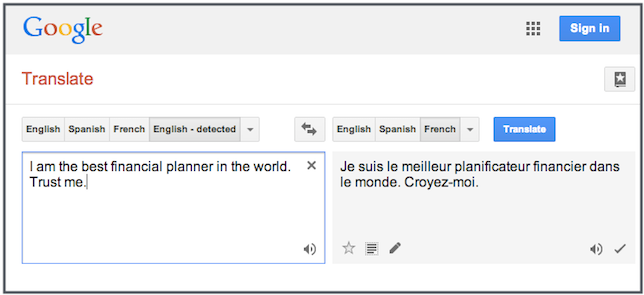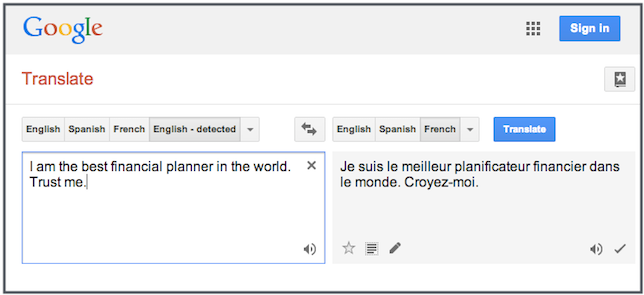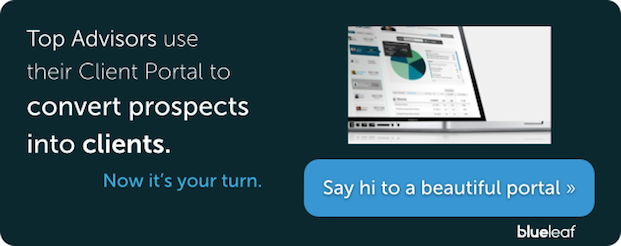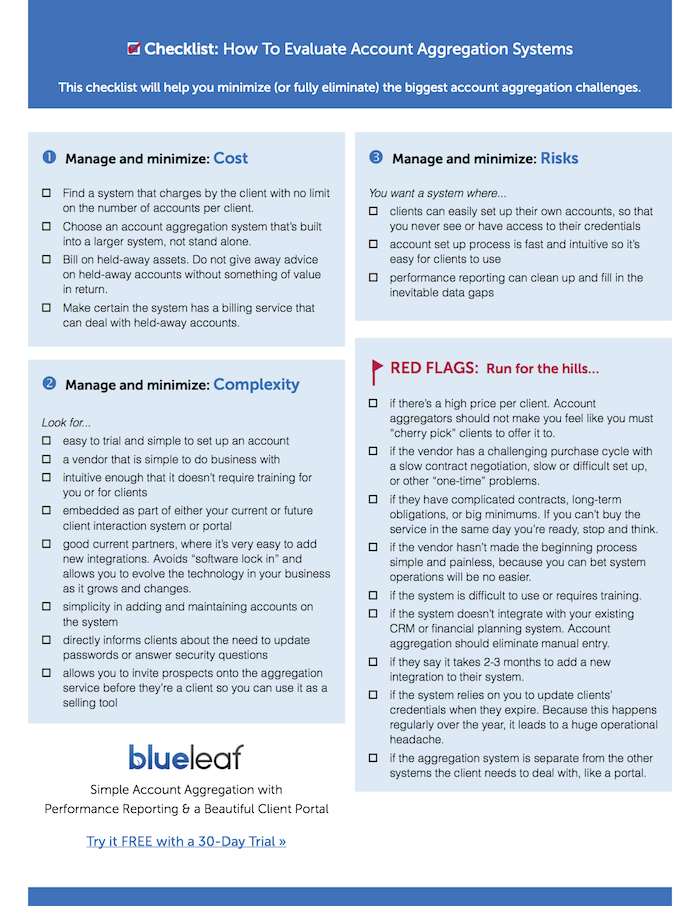How To Speak The Language of a Prospect

5 min Read
Everyone wants financial advice.
It’s just the truth.
Even you, a person in the business of giving financial advice, go out looking for information and guidance from others in the industry.
It really is indisputable – everyone could use what you’re selling. So why do some of your conversations with prospects feel… hard? If they want financial advice, shouldn’t each conversation be seamless and easy? And why is it so darn hard to get your website traffic to convert? Aren’t they eager to get your help? After all, you’re pretty awesome at what you do.
There’s the thing: You’re speaking French and they’re speaking Italian.
You show up to a meeting and rattle off a bunch of impressive things… in French. They answer in Italian, you listen, and then start speaking in French again.

Later, they go onto your website, check out your Twitter profile, and browse your blog. It’s all French. They run a few of the words you use through Google Translate, but it all seems like too much work. They don’t understand or connect with you. They don’t become a client.
Advisors need to speak Italian. 
No one says, “I want financial advice”, “I want retirement income planning”, “I want to speak with NAPFA-Registered Personal Financial Advisors”, “I want someone with sound fiduciary procedures” – yet these are all things you say about your business.
They say… I want to feel secure.
…I want to save up for my kid’s college.
…I want to retire at 64.
…I want to invest my play money in hot new technology companies.
…I want to meet someone who ‘gets’ me and cares to help.
It’s not about you. It’s about them. You need to speak their language.
APPLY IT in 3 Steps
When you start to learn French, you’ll begin to see holes in your current messages. You’ll notice the value in your service is not about how you’ll help them re-allocate their assets, or make them accountable with a budget, or report back on their progress. It’s about “I’m going to get you the results you’re looking for.”
How do you know what they’re looking for?
1 – LISTEN
When you meet with someone new, ask broad questions that will get them talking. Your first task is to listen to their language. Ask one of these, to start:
“Tell me about your financial situation as it is today. What’s up?”
“How do you feel about it all?”
“What things are you looking to improve?”
“Where would you like to be in 20 years?”
You’re listening.
They’ll say things like “Oh, my finances are fine. I earn a good salary, but I’m actually hoping to buy a vacation home soon.” Or “Ya know, my parents are both pretty sick and it’s putting some strain on my finances this year. I’m pretty nervous about my savings and cash flow not being enough.”
How do you respond?
2 – RELATE
Use their language. It’s still about them, not you. Care about the person and what they’re saying. It’s time to show them you can relate to their situation.
Here’s what you want to convey:
– Repeat their circumstance: “I can definitely understand (what you’re talking about).”
– Reiterate the change they desire: “Sounds like you want to (do this).”
– Continue the conversation: “Did you try (this common solution)?”
This will get them talking again. You want to start hearing about the solutions they’ve already tried and failed at. You want to open the conversation to finding out WHY their previous solutions (or attempts at finding a solution) didn’t work.
Understanding why other solutions didn’t work is the key to transitioning into a sale.
3 – TRANSITION
“Why didn’t (that solution you tried) work?”
“What didn’t you get out of (that solution you tried)?”
They’ll say, “Oh it was too difficult to figure out on my own.” Or “I couldn’t keep on top of it. I’m too busy at work to monitor that kind of stuff.” Or “I couldn’t even get started, I was so confused.”
They’ll give you their X.
Then if you can solve X, sell it.
(If you can’t solve X, don’t try to sell it. Trying to sell your services where they’re not needed will bring you right back into the language translation issue. You’ll sound like you’re speaking Italian again. This won’t work. Instead, send them to someone you know who can help. #Referrals #HeckYeah)
If you can solve it, sell it.
“Hey, I know it’s tough, because you don’t have X, but I can solve this.”
At this point you’re already helping them see a very specific situation in which you’ll be useful to them. They’re feeling pain, they told you about it, you listened, then you related, and now you’re transitioning into a little bit of action.
Here’s your closing line: “Let’s solve your X. Is there any reason you’re not ready to do this?”
They may say ‘money’ – “Can I afford you?” You need to talk about fee structure and offer to send a follow-up email, or similar.
They may say ‘spouse’ – “I want my spouse to be in on the decision.” You need to schedule another meeting.
Anything else? “Nope.” Boom. You’re in action.
Go speak Italian. It’s as easy as 1, 2, 3… uno, due, tre.

Process inspired by marketing guru Noah Kagan.

